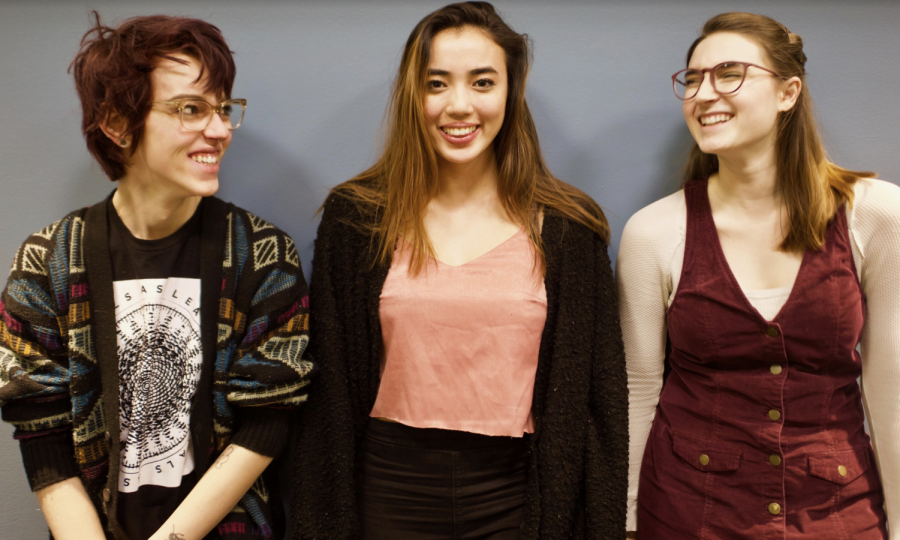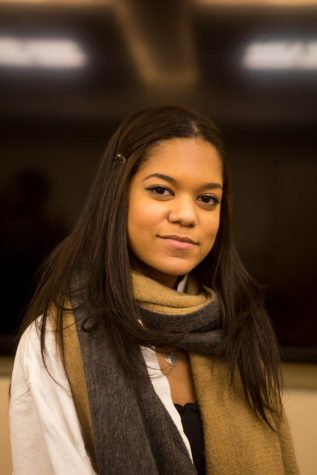‘Monologue Q’ Sets Stage for Empowerment
AMINA VARGAS/THE OBSERVER
With a directorial crew that consists of a trans woman, a cis woman and a non-binary person, “Monologue Q” aims to bring inclusivity to the traditional “Vagina Monologues.”
February 12, 2019
“The Vagina Monologues” debuted in 1996, but today, many students feel its reduction of women to genitalia is outdated. Fordham students have performed the play for more than 13 years and many recited their own monologues. Though integral to the wave of feminism back then, it continues to exclude transgender women in its lack of monologues about them. Now, in 2019, a student-led initiative will take the stage, offering a platform for the Fordham community to talk beyond gender issues.
What began as a one-woman show nearly two decades ago quickly turned into an award-winning play that inspired women’s empowerment. “The Vagina Monologues” features different women’s experiences regarding sex, menstruation, body hair and more.
However, with only a limited number of pieces regarding race and sexuality, “The Vagina Monologues” shows a lack of diversity and of inclusion.
That prompted three Fordham students to start their own production with student-written submissions, deviating from the original text. Entitled “Monologue Q,” its three co-directors are Kiley Campbell, Fordham College at Lincoln Center (FCLC) ’20, Camille Farrar, FCLC ’19 and Zen Mateo, FCLC ’19.
“The original text of the Monologues — in all its feminist glory — is not very intersectional,” Campbell explained. “It says that it takes a vagina to be a woman.” Therefore, Campbell said, “Monologue Q” will be a direct response to the problems “The Vagina Monologues” raises.
“The three of us all felt that Fordham students have more complex stories of gender, sexuality and queerness to tell that cannot be boxed into the category of vaginas,” Farrar said.
Farrar added that “Monologue Q” offers students the opportunity to speak about gender “across the spectrum of possibilities and the way in which it impacts people’s lives as an identity and form of power.”
In contrast to “The Vagina Monologues,” “Monologue Q” aims to address gender, sexuality and queerness through an anti-colonial lens, to be more inclusive of people of color and indigenous people. “We came to the conclusion that femininity wouldn’t be a broad enough topic,” Farrar said.
A half-intended reference to the musical “Avenue Q,” the production serves to represent all marginalized identities.
Other colleges in the U.S., namely Eastern Michigan University and the all-female Mount Holyoke College, have also canceled their production of the “Vagina Monologues,” for the same reasons.
After publicly announcing their new project on social media on Jan. 27, the three co-directors reached out to other student organizations at Fordham, including the Feminist Alliance, Rainbow Alliance and Students for Sex and Gender Equity Safety. They have also contacted students who have previously participated in “The Vagina Monologues.”
As of now, funding is still in question. In the past, student organizations were unable to fund “The Vagina Monologues.” The production was, however, supported financially by the Women, Gender, and Sexuality Studies department at Fordham.
The new project held its auditions during the first week of February. The search is not limited to actors and writers, however. To make the project more interdisciplinary, the co-directors will also hire visual artists, dancers, musicians and other crew members.
To Campbell, “Monologue Q” signifies a demarcation of a turning point in her life. She added, “I’m beyond proud to be in charge of this with two amazing people and I think that it reminds the Fordham community of the need to be defiant, to be angry about injustice.”
“I want to provide the opportunity of the people at Fordham to have a source of solidarity and a unique platform to say what they need to have heard,” Campbell added.
Performances of “Monologue Q” will happen by the end of April 2019.











